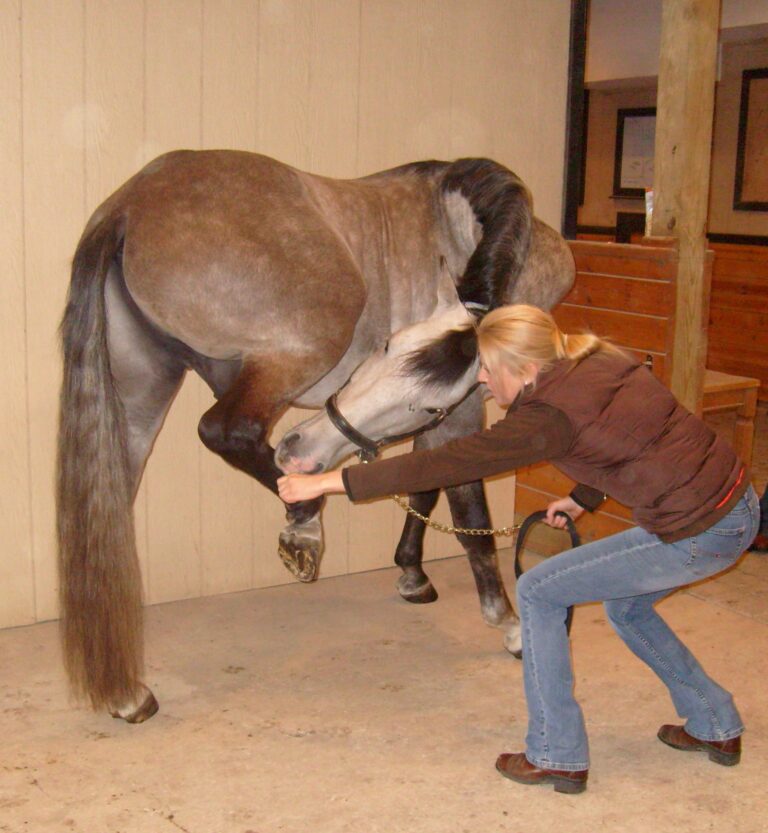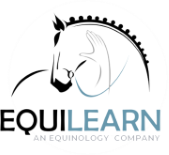EQ108LP: Equine Spinal Dysfunction: Motor Control & Functional Mobilization/Core Strengthening Techniques for Licensed Pros

Date:
Cost:
Duration:
Not Yet Open for Registration
*This course has been approved for 14 hours of continuing education credit in jurisdictions that recognize RACE approval.
This course presents an in-depth look at the spinal column in regards to biomechanics, function and dysfunction and joint mobilization. Muscular facilitation techniques, core strengthening exercises, and static/dynamic motion assessments are covered, in addition to extensive hands-on practicals and classroom theory. The information presented is evidence-based.
Participants will also have the opportunity to utilize the Equicore Concepts EQUIBAND™ system as well as other devices to improve strength, condition and proprioception. Advanced equine bodywork techniques are presented throughout the course, and proper protocols for utilizing these techniques is emphasized.
All concepts are anatomically and biomechanically referenced. The course will also include assessment of the entire horse, including both static and dynamic evaluation in regards to the muscular symmetry and neurological guidelines. The class is presented with loads of hands-on, specimens, illustrations and horses of varying body types and conditions.
This class runs from 8:30am-5:00pm daily with 30 minutes for lunch and 1.5 hours of evening study.
Theory:
- Biomechanics: evidence-based concepts of mechanoreception, nociception and joint mobilization/range of motion (ROM) in function/dysfunction of the equine spinal column
- Neuromotor control: evidence-based concepts of motor control in dynamic functional stability
- Evidence-based concepts of muscle activation and proprioceptive facilitation: rehabilitation versus conditioning/training
Practicals:
- Joint mobilization and ROM techniques for the spinal column (cervical and cervicothoracic region, thoracic and thoracolumbar region, lumbopelvic region, sacral/coccygeal region)
- Static/dynamic motion assessment with an emphasis on the development of muscular symmetry and/or asymmetry.
- Clinical reasoning based on findings from static and dynamic evaluations
- Muscular facilitation techniques/methods for proprioceptive activation
- Core strength activation/facilitation techniques
Participants must hold a recognized qualification in the field of equine healthcare (approved professions listed below). They must understand functional anatomy with regard to the musculoskeletal system and be able to palpate and identify surface anatomy. Participants must have confident horse handling skills, understand equine behavior and be comfortable working around different equine personalities and dispositions. Participants must have worked professionally and with horses for at least 1 year unless otherwise approved.
PROFESSIONALS ELIGIBLE TO ATTEND THE COURSE:
Veterinarians: Proof of degree must be provided upon registration. Participant must also fulfill the other prerequisites.
Physical Therapists: Proof of degree must be provided upon registration. Two letters of recommendation from veterinarians with regards to working with horses required. Participant must also satisfy the other prerequisites.
Doctors of Chiropractic: Proof of degree must be provided upon registration. Two letters of recommendation from veterinarians with regards to working with horses required. Participant must also satisfy the other prerequisites.
Doctor of Osteopathy: Proof of degree must be provided upon registration. Two letters of recommendation from veterinarians with regards to working with horses required. Participant must also satisfy the other prerequisites.
Equinology Equine Body Worker Graduates: To register for the EQ108LP course, students must have attended the Equinology EQ103 Advanced Equine Body Work Techniques course and successfully completed the course externship. Participant must also satisfy the other prerequisites.
Equine Massage Therapists: Proof of certification required from an outside equine bodywork program with hours (500+) and content (covering the major muscles and points) comparable to the EQ100. Students coming in from other programs must challenge the EEBW Certification Course prior to registering for the EQ108LP. There is an administrative fee of $150 for this challenge and a video presentation is required. Participants must have at least 1 year of field experience after the qualifying certification program. In addition, two letters of recommendation from veterinarians in regards to working with horses required. Participant must also satisfy the other prerequisites.
Veterinary Technicians & Pt Assistants: Must have at least 1 year of experience and practice after the certification in a professional setting with a veterinarian. Two letters of recommendation (one from employing veterinarian or licensed physical therapist) in regards to working with horses required. The letter must include a statement explaining your duties involved as a veterinary technician or PT assistant. Participant must also satisfy the other prerequisites.
Veterinary Students: Students in their final year only. Two letters of recommendation from veterinarians, advisors or instructors are required.
It is understood that some of the techniques presented do not allow non-veterinarians to utilize the methods demonstrated due to regulations.
Required Text:
Students must review the Anatomy and Physiology chapter of the text used in previous courses:
Anatomy of Equine Bodywork: The Equinology Approach by Debranne Pattillo
If you do not have this text, please contact us and we will send you a print out of this chapter.
Required Materials (included in course tuition):
Course Workbook
Course Handouts
Externship (included in tuition):
Externship Grading and Certificate
Dr. Nicole Rombach, APM (ITEC),
PG AM, MEEBW, CCBW, MSc., PhD, FEI PET
 Dr. Rombach attained the ITEC human massage qualification in 1997, the Equinology Equine Body Worker ® certification in 1998 and the Equinology Master Equine Body Worker ® certification in 1999. She also completed the post-graduate and Master of Science degree programs in Animal Manipulation from the McTimoney College of Chiropractic and University of Wales in the United Kingdom. She earned her PhD in 2013 from the College of Veterinary Medicine at Michigan State University. Her main interest lies in the effect of complementary therapies on equine performance, and the subject for her doctoral research was investigation into equine neck pain from the perspectives of pathology, neuromotor control and equine behavior associated with spinal dysfunction.
Dr. Rombach attained the ITEC human massage qualification in 1997, the Equinology Equine Body Worker ® certification in 1998 and the Equinology Master Equine Body Worker ® certification in 1999. She also completed the post-graduate and Master of Science degree programs in Animal Manipulation from the McTimoney College of Chiropractic and University of Wales in the United Kingdom. She earned her PhD in 2013 from the College of Veterinary Medicine at Michigan State University. Her main interest lies in the effect of complementary therapies on equine performance, and the subject for her doctoral research was investigation into equine neck pain from the perspectives of pathology, neuromotor control and equine behavior associated with spinal dysfunction.
Dr. Rombach is the founder and President of Equinenergy® Ltd. and Caninenergy Ltd, United Kingdom-based educational institutions that offer a variety of recognized certification courses in equine and canine complementary healthcare science. From 2003 to 2009 she was based in São Paulo, Brazil where she worked in direct liaison with various veterinary clinics, focusing on sports therapy for performance horses from novice to Olympic level. She traveled to national competition centers and private clients throughout Brazil and in other South American countries. In addition, she carried out infrared thermographic imaging (thermography) in conjunction with equine veterinarians to aid their diagnostic procedures. She also uses thermography to assess hoof balance, saddle fit and changes in thermal patterns following sports therapy sessions.
Dr. Rombach regularly lectures at various universities and for professional associations. She travels within the USA and to Europe and Brazil on a regular basis to teach several of the Equinology courses and to work on her established clientele of horses and dogs. She is the chief instructor and examiner for Neurokinetic Therapy (NKT) Equine and Canine worldwide. In addition to clinical consultations, Dr. Rombach is the Course Development Liaison Manager for Equinology, Inc., in charge of national and international expansion of the Equinology course curriculum.
A $350 deposit is required to hold your spot in a course – the remainder of the tuition is due at least 45 days prior to the course start date. The $350 deposit is nonrefundable and nontransferable, and is credited to the total tuition for the course. Confirmation letters, course outlines, required pre-study (if applicable), directions and lodging options will be sent when the $350 deposit has been received.
*This course has been approved for 14 hours of continuing education credit in jurisdictions that recognize RACE approval.
This course presents an in-depth look at the spinal column in regards to biomechanics, function and dysfunction and joint mobilization. Muscular facilitation techniques, core strengthening exercises, and static/dynamic motion assessments are covered, in addition to extensive hands-on practicals and classroom theory. The information presented is evidence-based.
Participants will also have the opportunity to utilize the Equicore Concepts EQUIBAND™ system as well as other devices to improve strength, condition and proprioception. Advanced equine bodywork techniques are presented throughout the course, and proper protocols for utilizing these techniques is emphasized.
All concepts are anatomically and biomechanically referenced. The course will also include assessment of the entire horse, including both static and dynamic evaluation in regards to the muscular symmetry and neurological guidelines. The class is presented with loads of hands-on, specimens, illustrations and horses of varying body types and conditions.
This class runs from 8:30am-5:00pm daily with 30 minutes for lunch and 1.5 hours of evening study.
Theory:
- Biomechanics: evidence-based concepts of mechanoreception, nociception and joint mobilization/range of motion (ROM) in function/dysfunction of the equine spinal column
- Neuromotor control: evidence-based concepts of motor control in dynamic functional stability
- Evidence-based concepts of muscle activation and proprioceptive facilitation: rehabilitation versus conditioning/training
Practicals:
- Joint mobilization and ROM techniques for the spinal column (cervical and cervicothoracic region, thoracic and thoracolumbar region, lumbopelvic region, sacral/coccygeal region)
- Static/dynamic motion assessment with an emphasis on the development of muscular symmetry and/or asymmetry.
- Clinical reasoning based on findings from static and dynamic evaluations
- Muscular facilitation techniques/methods for proprioceptive activation
- Core strength activation/facilitation techniques
Participants must hold a recognized qualification in the field of equine healthcare (approved professions listed below). They must understand functional anatomy with regard to the musculoskeletal system and be able to palpate and identify surface anatomy. Participants must have confident horse handling skills, understand equine behavior and be comfortable working around different equine personalities and dispositions. Participants must have worked professionally and with horses for at least 1 year unless otherwise approved.
PROFESSIONALS ELIGIBLE TO ATTEND THE COURSE:
Veterinarians: Proof of degree must be provided upon registration. Participant must also fulfill the other prerequisites.
Physical Therapists: Proof of degree must be provided upon registration. Two letters of recommendation from veterinarians with regards to working with horses required. Participant must also satisfy the other prerequisites.
Doctors of Chiropractic: Proof of degree must be provided upon registration. Two letters of recommendation from veterinarians with regards to working with horses required. Participant must also satisfy the other prerequisites.
Doctor of Osteopathy: Proof of degree must be provided upon registration. Two letters of recommendation from veterinarians with regards to working with horses required. Participant must also satisfy the other prerequisites.
Equinology Equine Body Worker Graduates: To register for the EQ108LP course, students must have attended the Equinology EQ103 Advanced Equine Body Work Techniques course and successfully completed the course externship. Participant must also satisfy the other prerequisites.
Equine Massage Therapists: Proof of certification required from an outside equine bodywork program with hours (500+) and content (covering the major muscles and points) comparable to the EQ100. Students coming in from other programs must challenge the EEBW Certification Course prior to registering for the EQ108LP. There is an administrative fee of $150 for this challenge and a video presentation is required. Participants must have at least 1 year of field experience after the qualifying certification program. In addition, two letters of recommendation from veterinarians in regards to working with horses required. Participant must also satisfy the other prerequisites.
Veterinary Technicians & Pt Assistants: Must have at least 1 year of experience and practice after the certification in a professional setting with a veterinarian. Two letters of recommendation (one from employing veterinarian or licensed physical therapist) in regards to working with horses required. The letter must include a statement explaining your duties involved as a veterinary technician or PT assistant. Participant must also satisfy the other prerequisites.
Veterinary Students: Students in their final year only. Two letters of recommendation from veterinarians, advisors or instructors are required.
It is understood that some of the techniques presented do not allow non-veterinarians to utilize the methods demonstrated due to regulations.
Required Text:
Students must review the Anatomy and Physiology chapter of the text used in previous courses:
Anatomy of Equine Bodywork: The Equinology Approach by Debranne Pattillo
If you do not have this text, please contact us and we will send you a print out of this chapter.
Required Materials (included in course tuition):
Course Workbook
Course Handouts
Externship (included in tuition):
Externship Grading and Certificate
Dr. Nicole Rombach, APM (ITEC),
PG AM, MEEBW, CCBW, MSc., PhD, FEI PET
 Dr. Rombach attained the ITEC human massage qualification in 1997, the Equinology Equine Body Worker ® certification in 1998 and the Equinology Master Equine Body Worker ® certification in 1999. She also completed the post-graduate and Master of Science degree programs in Animal Manipulation from the McTimoney College of Chiropractic and University of Wales in the United Kingdom. She earned her PhD in 2013 from the College of Veterinary Medicine at Michigan State University. Her main interest lies in the effect of complementary therapies on equine performance, and the subject for her doctoral research was investigation into equine neck pain from the perspectives of pathology, neuromotor control and equine behavior associated with spinal dysfunction.
Dr. Rombach attained the ITEC human massage qualification in 1997, the Equinology Equine Body Worker ® certification in 1998 and the Equinology Master Equine Body Worker ® certification in 1999. She also completed the post-graduate and Master of Science degree programs in Animal Manipulation from the McTimoney College of Chiropractic and University of Wales in the United Kingdom. She earned her PhD in 2013 from the College of Veterinary Medicine at Michigan State University. Her main interest lies in the effect of complementary therapies on equine performance, and the subject for her doctoral research was investigation into equine neck pain from the perspectives of pathology, neuromotor control and equine behavior associated with spinal dysfunction.
Dr. Rombach is the founder and President of Equinenergy® Ltd. and Caninenergy Ltd, United Kingdom-based educational institutions that offer a variety of recognized certification courses in equine and canine complementary healthcare science. From 2003 to 2009 she was based in São Paulo, Brazil where she worked in direct liaison with various veterinary clinics, focusing on sports therapy for performance horses from novice to Olympic level. She traveled to national competition centers and private clients throughout Brazil and in other South American countries. In addition, she carried out infrared thermographic imaging (thermography) in conjunction with equine veterinarians to aid their diagnostic procedures. She also uses thermography to assess hoof balance, saddle fit and changes in thermal patterns following sports therapy sessions.
Dr. Rombach regularly lectures at various universities and for professional associations. She travels within the USA and to Europe and Brazil on a regular basis to teach several of the Equinology courses and to work on her established clientele of horses and dogs. She is the chief instructor and examiner for Neurokinetic Therapy (NKT) Equine and Canine worldwide. In addition to clinical consultations, Dr. Rombach is the Course Development Liaison Manager for Equinology, Inc., in charge of national and international expansion of the Equinology course curriculum.
A $350 deposit is required to hold your spot in a course – the remainder of the tuition is due at least 45 days prior to the course start date. The $350 deposit is nonrefundable and nontransferable, and is credited to the total tuition for the course. Confirmation letters, course outlines, required pre-study (if applicable), directions and lodging options will be sent when the $350 deposit has been received.
